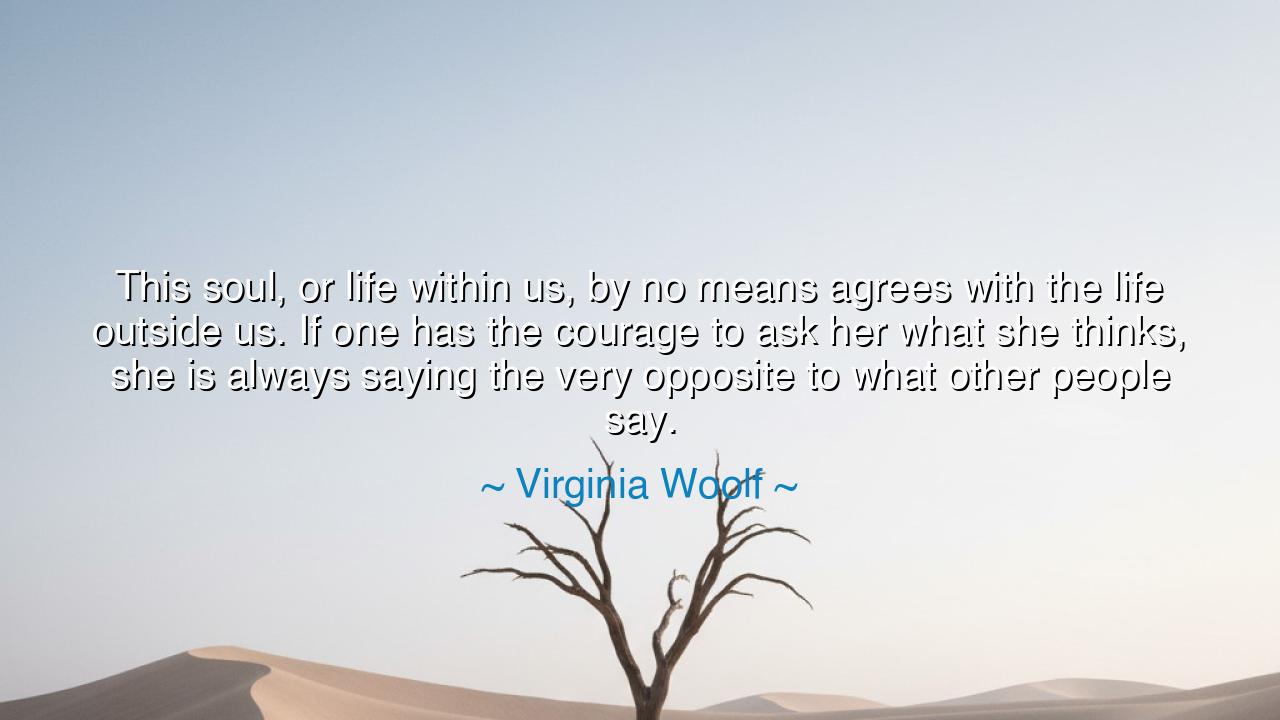
This soul, or life within us, by no means agrees with the life
This soul, or life within us, by no means agrees with the life outside us. If one has the courage to ask her what she thinks, she is always saying the very opposite to what other people say.






The words of Virginia Woolf — “This soul, or life within us, by no means agrees with the life outside us. If one has the courage to ask her what she thinks, she is always saying the very opposite to what other people say.” — are like a whisper from the depths of being, a revelation that stirs both awe and unease. In these lines, Woolf gives voice to the eternal struggle between the inner life and the outer world — between the quiet truth that lives within us and the clamor of society that seeks to define us. She invites us to turn inward, to listen to the soul, that secret and unyielding companion who speaks a language different from that of the crowd. But she also warns us: to hear this voice requires courage, for it often contradicts everything that is safe, conventional, or approved.
Woolf was no stranger to the conflict between inner and outer existence. Living in the early twentieth century — a time when the voices of women were muffled beneath the weight of expectation — she became a prophet of the inner self, the hidden consciousness that pulsed beneath the surface of polite society. In her novels, such as Mrs. Dalloway and To the Lighthouse, she sought to capture this invisible life — the trembling of thought, the rebellion of feeling, the quiet defiance of the spirit that refuses to conform. The quote reveals her own philosophy: that the soul within us often sees truth where the world sees illusion, and that to live authentically, one must honor that inner vision, even when it isolates us.
The ancients, too, spoke of this duality. The philosopher Socrates called it his daimonion — the inner voice that guided him against the opinion of the multitude. When the people of Athens condemned him to death, he did not waver, for he obeyed the truth within rather than the approval of the crowd. So too does Woolf echo this lineage of the wise: the recognition that the life within and the life without are often at odds. The world demands conformity, while the soul demands authenticity. To follow the soul is to stand apart, to risk misunderstanding — yet it is also the only path to true integrity and peace.
Consider the life of Galileo Galilei, who gazed at the stars and saw a truth that the world was not ready to accept. The Church, representing the “life outside,” declared the Earth to be the center of the universe, yet Galileo’s inner conviction — the soul’s knowledge — whispered otherwise. Though he faced condemnation and confinement, he chose the voice within over the power without. In the quiet of his solitude, he affirmed a universal truth: that courage is not the absence of fear, but the willingness to follow one’s inner light when all external lights are extinguished. Galileo’s story, like Woolf’s words, reminds us that the soul’s truth often appears as heresy before it becomes wisdom.
Woolf also understood the cost of such courage. The soul, when listened to, may speak of desires, doubts, and longings that society forbids. It may question the roles we play, the duties we accept, the beliefs we inherit. To heed it is to stand on uncertain ground, to risk the loss of belonging. Yet to ignore it is far worse — to live divided, hollow, false. Woolf’s own life, marked by both brilliance and suffering, was an ongoing dialogue with this inner voice. She once wrote, “I am rooted, but I flow.” This paradox captures her spirit — grounded in reality, yet flowing always toward the infinite currents of the mind and heart.
The life outside, she tells us, is often loud and uniform — driven by the opinions of others, by the pursuit of approval and security. But the life within is private, defiant, and sacred. To ask the soul “what she thinks” is to invite transformation; for she will not flatter you, she will not echo the crowd, she will demand truth. She is the whisper that says, “Be free,” when the world says, “Be safe.” She is the mirror that shows you what you truly are, not what you pretend to be. And she is the fire that burns away illusion, leaving only the essence of your being — luminous, untamed, alive.
So, dear soul, take this lesson from Virginia Woolf: do not be afraid to dwell in the conversation between your inner life and the outer world. Seek the quiet moments when you can listen to your inner voice. Ask it questions. Let it contradict, challenge, and even unsettle you. Then act, not from fear of judgment, but from the clarity of your inner truth. For every act born from the soul’s courage brings the world closer to honesty, and every person who dares to live from within becomes a light for others lost in the noise.
Remember: the world outside may be vast, but the world within is infinite. To live well is to let these two lives — the outer and the inner — meet in harmony. And though the soul will often disagree with the world, it is her dissent that keeps our humanity alive. Listen to her, honor her, and walk the path she shows you — for in her defiance lies not rebellion, but the truth of who you are.






AAdministratorAdministrator
Welcome, honored guests. Please leave a comment, we will respond soon